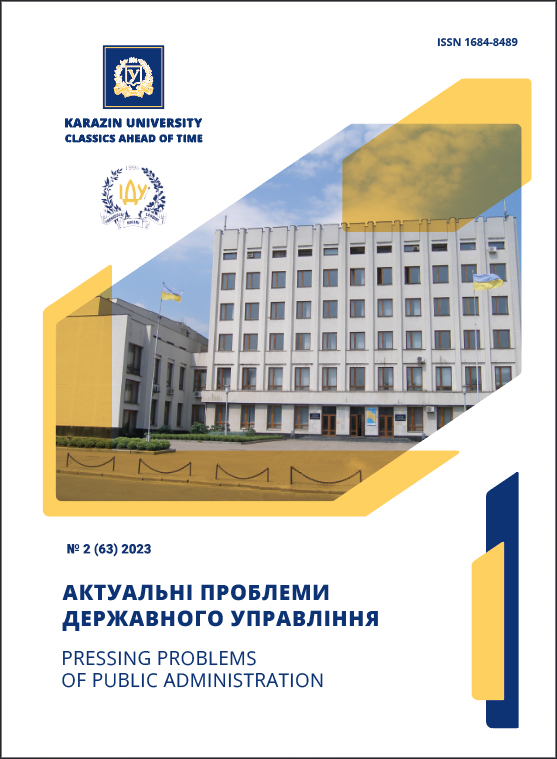Public Administration in a Context of Engaging Local Communities for Solar Energy Spreading: Analysis of Innovative Models and Challenges for Ukraine
Abstract
The article examines the opportunities and challenges related to the implementation of innovative solar energy models in urban and rural (settlement) territorial communities. It is identified that in urban communities, where there is high competition for space, solar energy opens up new possibilities for sustainable development through the integration of solar panels on the roofs of buildings, in office centers, and other urban structures, contributing to the reduction of dependence on traditional energy sources and decreasing carbon emissions. Innovative solutions, such as solar roads and facades generating energy, demonstrate significant potential for further integration into urbanized environments. At the same time, rural (settlement) areas face their own set of challenges and opportunities in using solar energy, where the lack of access to centralized energy supply makes it an ideal solution for providing local communities with electricity. Solar systems can be installed on individual houses, in schools, and hospitals, not only providing them with electricity but also contributing to social and economic development. Particularly, in the context of ensuring safety and improving the comfort level of local residents, the use of autonomous street lighting systems in remote areas, capable of operating without connection to the electrical grid due to being fully powered by solar energy, which is unlimited in supply and harmless to the natural environment, deserves special attention.
Moreover, the agricultural sector can also reap significant benefits from the development of solar energy by using photovoltaic systems for irrigation, ventilation, and other needs of farming operations. At the same time, the transition to solar energy is accompanied by certain challenges, including integration into existing power grids, energy storage, regulatory and financial barriers, etc. However, progress in battery technology development, improvements in the political and economic climate, and increasing public support are contributing to the industry’s development. The article analyzes how solar energy can transform urban and rural landscapes, creating new business models and promoting sustainable and economically viable futures. A series of successful solar energy use cases that demonstrate its potential for urban and rural (settlement) areas are considered. The article emphasizes the importance of integrating solar energy into the overall energy system and the need to focus joint efforts of public authorities, business structures, and civil society to overcome existing challenges. The scientific novelty of the study lies in the comprehensive analysis and synthesis of contemporary cutting-edge approaches to the implementation of projects in the field of solar energy, which can ensure efficient use of solar energy under the conditions of various types of territorial communities, which is extremely relevant under the conditions of post-war recovery and development.
Downloads
References
Amons, S. & Krasnyak, O. (2023). Ecologization of agricultural production as the basis of the formation of the food security system of Ukraine. Ekonomika ta suspilstvo, (47), 47−41. DOI: https://doi.org/10.32782/2524-0072/2023-47-41 [in Ukrainian].
Kudriya, S.O. (2020). Renewable energy sources Kyyiv. Instytut vidnovlyuvanoyi enerhetyky NANU [in Ukrainian].
Furdychko, O.I. (Ed.). (2022). Ekoloho-ekonomichni zasady zbalansovanoho ahrarnoho vyrobnytstva ta vykorystannya pryrodnykh resursiv ahrosfery: monohrafiya. Kyiv, DIA [in Ukrainian].
Кucherjava, К.Yu., Оrel, Yu.L. Theoretical aspects of state regulation of small and medium-sized enterprise. Aktualjni problem derzavnoho upravlinnja, 2020, no. 2 (58), 32−41. DOI: https://periodicals.karazin.ua/apdu/article/view/19420 [in Ukrainian].
Makedon, V.V., Mykhaylenko, O.G. (2022). Management of internal investment projects in the regional industrial cluster of enterprises2. Pidpryyemnytstvo ta innovatsiyi, (25), 56−63. DOI: https://doi.org/10.32782/2415-3583/25.9 [in Ukrainian].
Makedon, V.V., Kholod, O.H., Yarmolenko, L. I. (2023). The model of assessing the competitiveness of high-tech enterprises based on the formation of key competencies. Akademichnyy ohlyad, 2(59), 75−89. DOI: https://doi.org/10.32342/2074-5354-2023-2-59-5 [in Ukrainian].
Parizjka ugoda, ratifikovana Ukrainoju zakonom № 1469-VIII vid 14.07.2016. URL: https://zakon.rada.gov.ua/laws/show/995_l61#Text [in Ukrainian].
Frayyer, E. (2021). Development of renewable energy: the experience of East Germany for Ukraine. Journal of European Economy, T. 20, no. 3, 464−483. URL: http://nbuv.gov.ua/UJRN/jee_2021_20_3_6 [in Ukrainian].
Chumachenko, O. (2022). The role of renewable energy sources in the electricity balance of Ukraine. Vcheni zapysky Universytetu «KROK» [Scientific notes of the “KROK” University], 3(67), 39−47. DOI: https://doi.org/10.31732/2663-2209-2022-67-39-47 [in Ukrainian].
Yarmola, K.V. (2023). Stratehiyi vykhodu kompaniy na rynok vidnovlyuvalnykh dzherel enerhiyi v umovakh hlobalnykh klimatychnykh zmin. Novi kompetentsiyi dlya Industriyi 5.0 ta upravlinnya danymy dlya zakladiv vyshchoyi osvity [Strategies for companies to enter the market of renewable energy sources in conditions of global climate change. New competencies for Industry 5.0 and data management for institutions of higher education: collection of materials of the round table]: zbirnyk materialiv kruhloho stolu / pid zah. red. Khrapkinoyi V.V., Pichyk K.V.; Natsionalnyy universytet “Kyyevo-Mohylyansʹka akademiya, Kyyiv. NaUKMA [in Ukrainian].
Affordable and Clean Energy. Swedish Energy Agency (2021). URL: http://www.energimyndigheten.se/ en/aboutus/
EarthExplorer. (2023). URL: https://earthexplorer.usgs.gov/
Makedon V., Dzeveluk A., Khaustova Y., Bieliakova O., Nazarenko I. (2021). Enterprise multi-level energy efficiency management system development. International Journal of Energy, Environment, and Economics, vol. 29, is. 1, 73−91.
Products. Energy, sustainability and innovation. Enel Group. URL: https://www.enel.com/company/services-and-products/
Sun Street is a US-based holding company specialized in the consolidation of three key divisions: European windows and doors, solar panel installation, and kitchen furniture. Official website. URL: https://sunstreetusa.com/
SOLHO is a high-tech company that designs, builds and manages solar systems in the industrial, agricultural and residential sectors. Official website. URL: https://earthexplorer.usgs.gov/
Qin T., Wang L., Zhou Y., Guo L., Jiang G., Zhang L. (2022). Digital Technology-and-Services-Driven Sustainable Transformation of Agriculture: Cases of China and the EU. Agriculture, no. 12, 297. DOI: https://doi.org/10.3390/agriculture12020297

